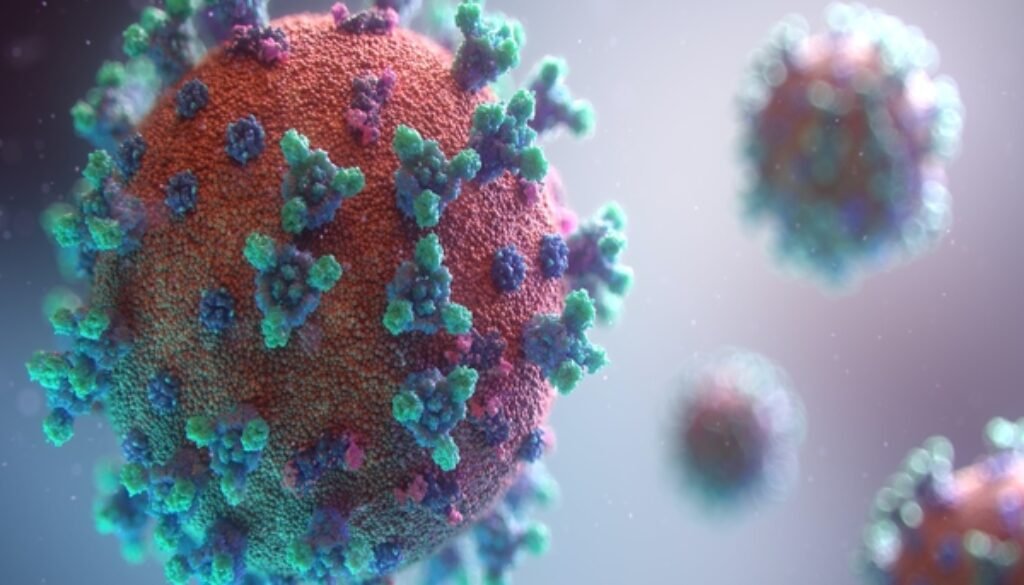Covid-19 and Mental Health, The Direct Effects on The Brain
Covid-19 and Mental Health
The spread of Covid-19 has had – and is still having – a significant impact on our lives. The consequences are the most disparate ones, ranging from direct problems (severe symptoms which affect the lungs and may lead to intensive care or, in the worst cases, to death) to rather indirect matters (sociopolitical and economic issues).

Among these, we must not forget to take care of our mental health. In this regard, several studies have shown that a high percentage of people (especially adolescents and elderly men and women) have faced conditions like depression, anxiety, loneliness, and sleeping trouble during the periods of lockdown and after recovering from Covid-19.1
Two Ways of Effect
To understand these results, it is useful to analyze two different questions separately:
- What are the direct effects of Covid-19 on the brain and mental health?
- What are the indirect effects of Covid-19 on the brain and mental health?
In this post, we will answer the first question. To do this, we will consider some biological processes which indicate how SARS-Cov-2 invades the brain and damages some areas. Brain areas that, in turn, increase the risks of developing (!) depression.

And for those who I am listening to that are questioning “what about the second question?”, you can read it in another post. In this demand, we will review the impact of restrictive measures and quarantine on mental health.
The Effects of Covid-19 on Brain
How does Sars-Cov-2 invade the brain?
To begin, the key issue to investigate is: how does SARS-Cov-2 “penetrate” the brain?
For a while1, evidence for this fact was lacking, and there was only space for conjectures. Recently, however, it has been observed that SARS-Cov-2 harms the olfactory system (the bodily structures that serve the sense of smell). The latter also contributes to a loss of gray matter (the darker tissue of the brain, consisting mainly of nerve cell bodies and branching dendrites).
It is probably from the olfactory mucosa, which is confines within the brain, that SARS-Cov-2 contacts with the star-shaped cells that regulate many functions in our central nervous system named astrocytes.2
Sars-Cov-2 needs not reach the brain, only astrocytes
More precisely, Sars-Cov-2 activates pro-inflammatory cytokines that cross the blood-brain barrier and trigger microglia and astrocytes. This leads to an upregulation of a certain kind of receptors, called NMDA, that might consequently result in neurotoxicity (which takes various forms).1
Following this path, it has been proven that both people with mild and severe symptoms of Covid-19 show damage to astrocytes, while neurons seem to remain untouched by the virus.2,3
This is interesting to notice because Sars-Cov-2 needs not to reach the brain. It is because of the role of astrocytes and their link to the synopsis that brain injuries take place. These infected cells do not act anymore normally, and they provoke some damage to neurons. In turn, these synaptic deficits are related to changes in the expression of some genes which, in several cases, produce additional dysfunctions.2,3

Although this information already gives a detailed overview of what goes on in the brain after the infection by Covid-19, the researchers have gone a little further.
The explanation
Indeed, they have identified a cluster of astrocytes with a dis-regularization of the genes of neurotransmissions. The presence of disease-associated microglia, moreover, confirms that the brain undergoes a process of inflammations that may or may not evolve in more severe neurological consequences.3
Such inflammations alter the levels of chemical substances like putamen and caudate, causing a type of depression. In most cases, it cannot be treated with common antidepressants. It is hypothesized that this process is similar to traumatic brain injuries since even in this case the inflammations and the loss of neurons eventually evolve into depression.1
It is thus this peculiarity that yields the solution to the initial problem: A modification of the normal work of astrocytes explains the development of depression and other neurological issues, precisely because of their special function.
However, among other long-term effects of people who are infected with Covid-19, neurological issues are less probable. And even for those who reported long-term depression effects, only 3% to 12% of those cases, it has been observed severe depression lasting more than twelve weeks.2,4
Takeaway
It is the truth that Covid-19 has changed completely our lives. This pandemic came out of nowhere and it generated a “new normal”. Although we used to say that is temporary, seems that it’s becoming more than permanent. Nowadays, when we have to protect ourselves and our beloved people from this new disease, it appears that we have, also, to take into account the information we learned today.
Covid-19 not only affects our lunges and leads to severe symptoms or intensive care and even death (in worst cases) but it’s also affecting our brains. Even though we could expect indirect effects, the direct effects on our mental health are something unexpected. And, of course, this is a further reason to take care of ourselves and protect our beloved people from Sars-Cov-2.
Read the post in which we discuss the indirect effects of Covid-19 on mental health; you will have a more comprehensive understanding of the subject. Otherwise, stay informed, find out our book recommendations, and take care of your mind!!
References
- Boldrini M, Canoll PD, Klein RS. How COVID-19 Affects the Brain.
- Douaud G, Lee S, Alfaro-Almagro F, et al. SARS-CoV-2 is associated with changes in brain structure in UK Biobank.
- Yang AC, Kern F, Losada PM, et al. Dysregulation of brain and choroid plexus cell types in severe COVID-19.
- Lopez-Leon S, Wegman-Ostrosky T, Perelman C, et al. More than 50 long-term effects of COVID-19: a systematic review and meta-analysis.





Covid-19 And Mental Health, The Indirect Effects On The Brain
April 9, 2022 @ 1:40 pm
[…] Covid-19 and mental health. On the previous post we talked thoroughly about the direct effects of Covid-19 on brain. We saw how SARS-Cov-2 manage to […]